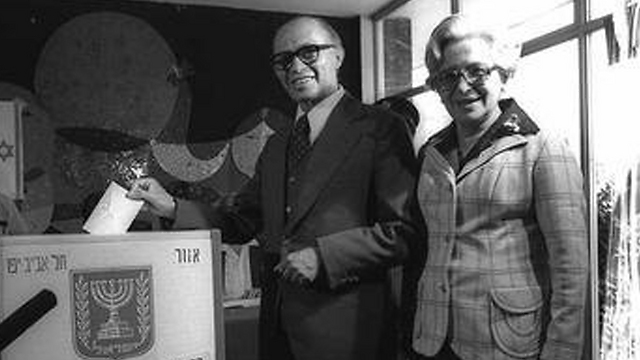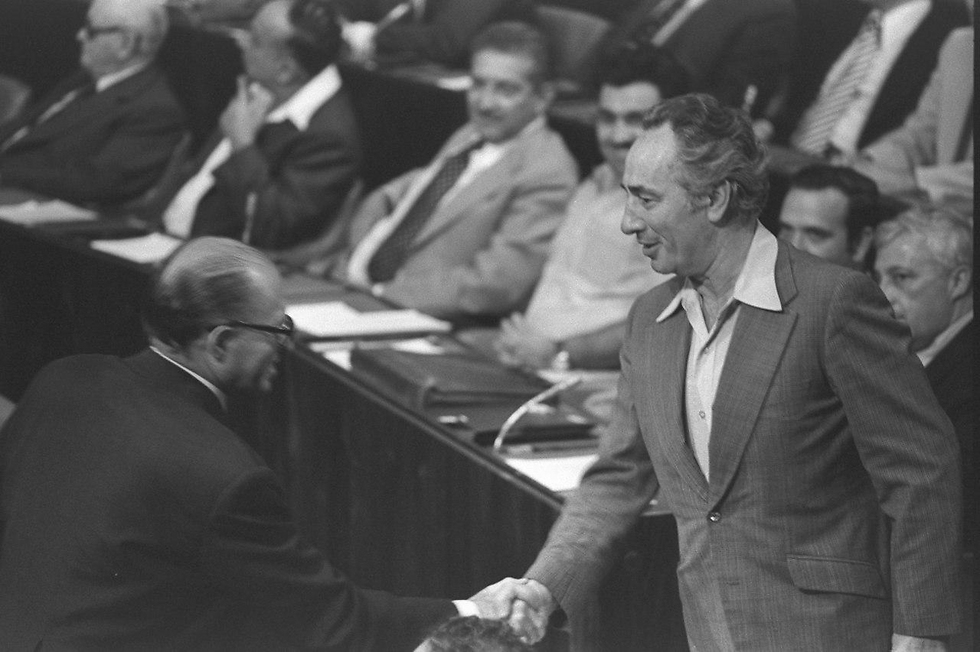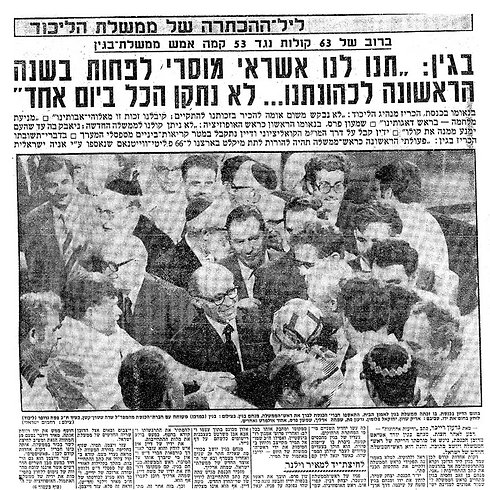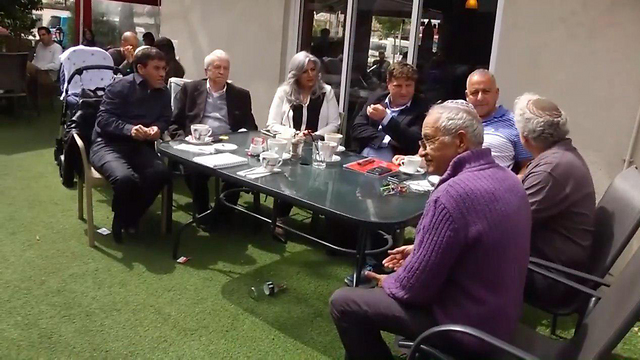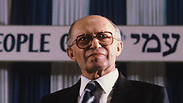

Likudniks recall 40 years since their dramatic win
Nearly 30 years of left-wing rule ended with anchorman Haim Yavin's declaration of 'a revolution.' 'People went wild,' say veteran activists to Ynet, as they recall feelings of discrimination that brought about the political change, as well as their longing for Menachem Begin.
The night of May 17, 1977, is one that none of them will forget. For each of them, it was a moment of political and personal victory, after years of deprivation and discrimination. The results of the elections to the Ninth Knesset led to the end of the almost three-decade rule of Mapai and the Ma'arach—both precursors of the present-day Labor party. Even today, 40 Years after the revolution in the 1977 elections, it seems that this was the most significant and dramatic election campaign in the history of the state in Israeli politics.
"There was a yearning for change," says Michel Buskila, a member of Ashkelon Municipal Council and one of the city's central Likud activists. "When the results came in, people took to the streets and went wild, because we were a stronghold of the Likud."
Likud activists in Petah Tikva similarly recall that historic night. "It was a real revolution," says Yigal Cohen, of the moment when he realized that the next prime minister would be the eternal leader of the opposition, Menachem Begin. "At about 9:00 PM, after the results of the initial sample of Channel 1 were announced, we went outside and what we saw was inconceivable: car horns everywhere and people rejoicing."
'We felt that our turn had come'
The Likud won 43 seats in those elections, while the Ma'arach won 32, suffering a 19-mandate drop. Likudniks today see this turbulent election campaign as the beginning of a historic rectification. According to them, voters expressed their desire for change in the most decisive way possible. Four decades later, and the older Likudniks still will not forget the Histadrut's red notebook, which in many cases opened doors to better jobs and health and education services, but not for everyone. The red notebook became the trademark of the left-wing Mapai regime, and for many Likud activists was also one of the main reasons for the fall of the Labor Party.
"The discrimination against Sephardi Jews was the main reason for Begin's rise to power," says David Simchi of Petah Tikva. "It was blatant discrimination, and we simply were not prepared to feel more what we felt anymore."
Shalom Said recalls the air of superiority that inner city Sephardim felt from Ashkenazi kibbutz members. "We saw them only during the elections campaign, when they came to make sure that we voted for Mapai. After that they disappeared. "
The activists point to another factor that led to Begin's rise to power: the many corruption affairs that were linked to senior members of the Labor Party. Among them was the resignation of then Labor leader Yitzhak Rabin, who resigned over his wife Leah's bank account; the bribe received by Asher Yadlin, one of a number of convicted members of the party; and the case of Avraham Ofer, who served as housing minister in Rabin's government and was suspected of accepting bribes, who then committed suicide. "They admitted these crimes, and therefore there was an atmosphere of corruption in the ruling party," says attorney Shaul Tzur of Ashkelon, adding that "this was certainly one of the factors that brought on the change." Shlomo Gavera from Rishon Letzion also points to a general sense of disgust with corruption among the citizens of the state. "Leah Rabin's account for dollars was it for us," he says.
It was not only the problematic image of the Labor Party that undermined the party, but also public opinion about the functioning of the Israeli government during the Yom Kippur War in 1973. The failure was largely attributed to the leadership of the Labor Party. Many veteran Likudniks are convinced that this, too, played into Begin's hands.
The Revolution of 1977
Even today, the Histadrut's red notebook appears to be just as strong a symbol of systematic discrimination. "When we were children, we felt the deprivation," says Simchi. "They would not even let our parents work in the orchards. It was a very hard feeling that went deep inside me, I carried this with me all the time; they controlled everything, and if you did not have a red notebook, you could not find a job."
The feeling of insult from Mapai's rule is still evident on Simchi's face, which talks with excitement about the expectations they had of Begin in those days: "It was joy. We longed for someone to look at us differently, not as poor people who do not contribute anything. "Moshe Sa'adon added:" We were second-class, and it felt that way. It began in school and continued into the army, when they recruited us with the criminals. The attitude to us was different. "
For those Likudniks who brought him to power, Begin was someone who promised a new order, but also so much more. "Begin was traditional," says Ariel Buchnik, a Likud activist from Petah Tikva. "He always had a kippa in his pocket. It resonated with us. Most of the Sephardim identified with that."
When asked whether Begin kept his promises, most answer in the affirmative. In Petah Tikva, Ashkelon and Rishon Letzion, Likud activists do not forget one of the hallmarks of Begin's first government: the Neighborhood Restoration Project, which aspired to create a new set of priorities in governmental budgets.
'There are those who mock the heritage'
None of them ever thought of leaving the Likud. They believe in the movement's journey, though when asked about the party's current situation, 40 years after that sweeping upheaval, the nostalgic smiles are replaced with a more serious expression. "I think Begin would be happy to see what is happening in the country and the party," says Buskila, "but I will not sweep it under the surface. He would have liked to tell the current leadership: 'Friends, do everything in your power to make sure that certain MKS will not come near the Knesset within the next one hundred years."
With regard to the current situation, it appears that the activists are in agreement. They are convinced that the Likud governments have benefited the Sephardim and the neighborhoods. "We have problems, but we do not want to return to Mapai's rule," says Simhi, "The Likud's investment in the neighborhoods is evident and the overall situation is much better," agrees Said, noting the improvement in infrastructure and the narrowing of social gaps, their.
Rami Greenberg, a member of the Petah Tikva Municiapl Council and a well-known activist in the city, is convinced that the Likud today is as strong as it was, but agrees that there are people who took the party to other districts and caused it damage. "It's painful to see what is happening around us today, and not just in the Likud," he says. "I would like to see a lot of Menachem Begins today, not in terms of power, but in what he exuded. Some who aims to be a servant of the public, instead of someone looking to see how the public can serve him."














